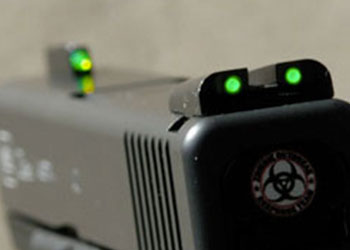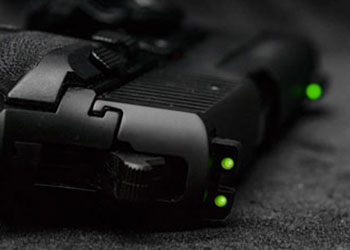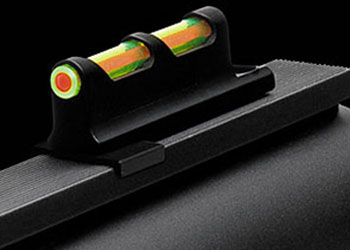FN FNX 40 Sights
Many people say they’d want to have a cat’s life, because they could sleep all day. If I was ever to become a cat, it would be for its ability to see in the dark. Night vision is an important feature for many gun owners, especially those who often find themselves in tactical situations. One of the solutions to this issue are night sights, at which we will have a closer look now.
Types Of Night Sights
Night sights are small optic devices that are most frequently installed on the rear and front end of your handgun. They are designed to enable you to see better in low light situations and also enhance your accuracy. The night sights come in more versions – Photoluminescent nights sights, Tritium nights sights, fiber optic nights sights. What’s a great plus of these sights is the fact that compared to, let’s say, red dot sights, night sights are much more compact, less noticeable, thus more ideal for your everyday carry.
Photoluminescent Night Sights
Photoluminescent night sights for the FN FNX 40 transform low-light shooting, absorbing light all day to emit a bright glow in darker conditions, enhancing target visibility for FN FNX 40 users. These sights eliminate the need for batteries by harnessing natural light, making them ideal for rapid target identification in self-defense scenarios. Easy to install, they provide an immediate upgrade to the FN FNX 40's sighting system, boosting confidence in shot placement regardless of lighting conditions.
Their effectiveness, however, depends on prior light exposure, potentially limiting their use in unexpected low-light situations. Over time, the sights may require recharging with light to keep them glowing brightly. While they offer significant advantages at dusk or dawn, their performance in total darkness doesn't compare to tritium night sights. Still, for FN FNX 40 owners, photoluminescent night sights offer a low-maintenance, cost-effective solution to improve night shooting without the need for electronic components.
|
Pros • No Battery Required • Enhanced Low-Light Accuracy • User-Friendly Upgrade |
Cons • Light Exposure Dependency • Glow Intensity Diminishes • Limited in Complete Darkness
|
Tritium Night Sights
Tritium night sights are a game-changer for FN FNX 40 owners seeking reliable, low-light targeting capabilities. These sights utilize small amounts of tritium, a radioactive isotope, to provide a consistent glow without the need for external light sources or batteries. This makes them an ideal choice for self-defense scenarios, where quick target acquisition is critical, regardless of the lighting conditions.
The glow from the tritium is subtle yet clear, ensuring it does not overpower your night vision or distract from the target. Unlike photoluminescent sights, tritium night sights do not require "charging" with light, offering unwavering performance through any situation. Their robust construction also means they are built to last, often matching the lifespan of the firearm itself. For FN FNX 40 users, tritium night sights are an excellent investment for enhancing shooting accuracy and confidence in low-light environments.
|
Pros • Self-Illuminating • Durability • Improved Accuracy |
Cons • Higher Cost • Non-Replacable Tritium • Limited Brightness
|
Fiber Optic Sights
Fiber optic sights are a popular upgrade for FN FNX 40 enthusiasts looking to improve their target acquisition speed and accuracy in varying lighting conditions. These sights capture and channel natural or ambient light to their ends, creating bright, easy-to-see dots that dramatically enhance sight visibility. Unlike tritium or photoluminescent sights, fiber optic sights shine brightest in well-lit environments, making them particularly advantageous for daytime outdoor shooting activities.
The vibrant colors available for fiber optic sights—typically red, green, or yellow—allow for quick eye alignment and target focus, facilitating faster and more confident shooting. Installation on the FN FNX 40 is straightforward, offering a simple yet effective modification that does not alter the firearm's balance or handling. While they do not glow in the dark like tritium night sights, their high visibility in daylight can significantly improve shooting performance during the day. For shooters participating in competitive shooting or who frequent well-lit ranges, fiber optic sights on the FN FNX 40 offer an unbeatable combination of visibility and precision.
|
Pros • Exceptional Daylight Visibility • Variety Of Colors • Easy Installation |
Cons • Limited Low-Light Performance • Durability Concerns • Dependence on Ambient Light
|
Best Night Sights Brands
If you are interested in trying out a set of night sights and you don’t know where to start, these brands are generally considered among the best night sights developers – AmeriGlo, Trijicon, Truglo, Meprolights and HiViz. There are many more gun optics companies out there, but for now, let’s stick to these 5 and have a closer look at who these companies are and what products you can find in their offer.
Ameriglo
AmeriGlo Firearm Sights, a company based in Roswell, Georgia, focuses on production of high quality tritium, painted dot, fiber dot, and custom OEM iron sights that are meant mainly for wearers of modern handguns. Their main focus are gun accessories for guns by the most renown gun manufacturers such as Glock, Smith & Wesson, Sig Sauer, and Beretta, but you can also find something for AR15s in their wide selection. They are a company with probably the largest number of night sight products and their price range is from $20 to around $130. Although some of their products might be more expensive, with AmeriGlo you can be sure that you’ll get the quality you have paid for.
Trijicon
Trijicon, a company currently residing in Wixom, Michigan, has been focusing on development of superior any-light aiming systems since its founding in 1981. They take pride in their cooperation with the U.S. Marine Corps as well as partnership with government, state, and local law enforcement agencies. Their production mainly focuses on industry-leading riflescopes, red dot sights, electro optics, iron sights, and night sights especially. They also offer products for archers or sight solutions for special purposes (reflex red dot sights). Moreover, you can also suit up at Trijicon, as they also sell gear for shooters such as shirts, pullovers, jackets and hats.
Truglo
TruGlo is a brand name that probably every single gun owner has already heard of. The company is based in Richardson, Texas, and they are among the leaders on the gun optics market. In their selection, you can find products such as red-dots, tactical scopes, hunting scopes, lasers and many others. What sets them apart from the competition is the fact that they don’t only focus on accessories for handguns and rifles, but they also produce various applications for bows and crossbows among their offer. They are probably more famous for their red dot sights, but they have a division of high quality night sight as well.
Meprolight
Meprolight USA are a Middletown, Pennsylvania company specializing in production of gun sights of various types, red dot sights, electro-optical red dot sights, day/night self-illuminated reflex sights, thermal weapon sights, and many more. The company’s vision is to provide the best aiming devices solutions and support for any of your shooting needs. They also promise to continuously improve their products based on the needs of the end user that they try to understand and fulfil. What’s great about Meprolight is the fact that they offer illumination and sight precision solutions for these areas: Military & Law Enforcement, self-defense, sport shooting, and hunting.
HiViz
HiViz Shooting Systems is a Laramie, Wyoming based company that focuses on production of handgun, shotgun, rifles, and tactical rifles sights as well as some other shooting optics-related products. Their Magni-Optic® technology that aids target shooters by encouraging a two-eyes-open approach regardless of dominant eye or which hand you shoot with. This technology is meant to deliver more rapid target acquisition, more accurate determination of distance and better hand-eye coordination. HiViz is a promise of the highest quality materials tested by real shooters “to ensure they’ll withstand the test of time.”
WHY WOULD I GET A NIGHT SIGHT? - BENEFITS OF NIGHT SIGHTS
Even if you aren’t lurking out in the streets at night often, a set of night sights could be a good solution for you, as there are definitely moments when you want to see a bit clearer. Night sights seem to be the right choice for a comfortable carry of night sights around the clock. These tactical and everyday night sights have some downsides, but advantages outweigh them anytime. In general, the biggest advantages of night sights are considered the following:
- Accurate shooting in low or even no light situations
- They are compact in size and ideal for everyday carry
- Can work as an upgrade over factory sights
- Longevity of tritium sights
- Come in different colors – green, red, yellow
- Can be used in daylight - they are not only meant for night
- Help you find your gun quicker in a low-light environment
- They don’t require difficult installation
No matter how you rank these benefits importance-wise, but it’s obvious that if you are looking for better visibility at night or simply in darker environments, night sights are a great and fairly affordable option for you. They won’t weigh your gun down by much and they will grant you better target acquisition and overall gun confidence in situations that are not that bright. Although they might get a bit pricey, if you go with the trusted brands, you’ll definitely not regret it.
How To Mount A Night Sight
Night sights installation is fairly simple. Although most people choose the easier way and go to their local gunsmith to have their night sights installed, you can definitely. However, if you are comfortable with tools and simple machinery, the job is not difficult and fairly straightforward. Well, of course it’s better if your hands are nimble and skilled at at least the basic workshop operations. Let’s have a quick look at what you’ll go through if you have a go at mounting a night sight set for your gun.
If you own, let’s say, a Glock, you will first need to get a set of glock make-respective night sights. Once you get hold of them, there will be a couple of other tools you will need. You’ll definitely need a table vise. Don’t be afraid if you’ve never worked the tool, a session or two will give you the basic understanding of it. You need to disassemble your glock first, but be safe about it, please. Night Fision, another night sights oriented gun accessories company, advises to apply their and other night sights to Glock aftermarket slides ready for applications, which have been growing in popularity lately. So if you get one of those too, even better.
You will need a punch, hammer and table vise, perhaps some sanding the material down too. Before you start, make sure the slide and the sights are cleaned well. The rear part of the set should slide in from some part easily and then you will need to apply some force with a hammer to get it in. If you have a problem pushing this part into the slide, you might need to file it down with sanding material. Although you will need quite a lot of force to slide the sight in, try to be gentle. The other part of the set, the suppressor sight, is attached to the front of the slide. Its application is fairly easier than the rear sight part. You need to glue it in, for example with Locktite, and then hand tight the screw inside of the sight with a fitting driver. Make sure you apply appropriate force, you don’t want to overdo it and perhaps even damage the pieces. After some time the parts should properly settle in and you’ll be good to put your gun back together. This was put in layman terms, but if you want a more precise guide on how to install a particular night sight on your gun, there are many video guides out there. I’m sure you won’t have any real trouble improving your gun optics at home.
FN FNX 40
Sight Alignment & Accuracy Tips
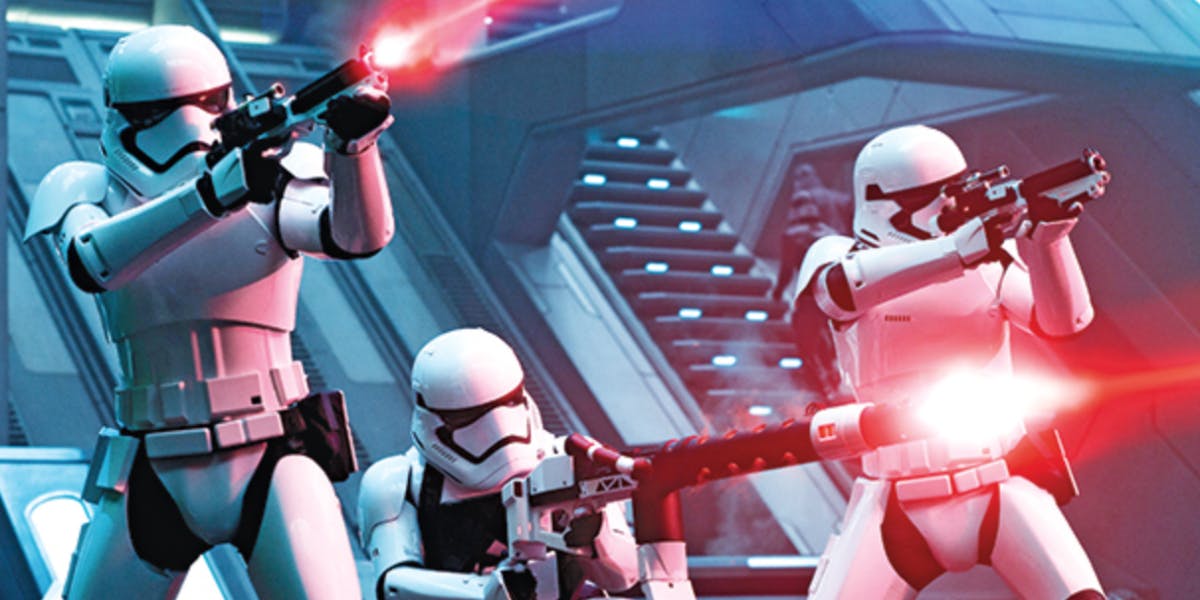
Aiming your FN FNX 40 correctly is a thing you have to master in order to perform better. The major keys to aiming and effective target hits are properly aligned sights, proper sight picture and little movement while you are on target. The hat of the battle or any dangerous situation may cause your aim to be worse, but practice makes perfect.
Aiming consists of two major elements, sight alignment and sight picture. The goal is to get the point of alignment equal to the point of impact. Sight alignment relates to the rear and front sight. Simply, the eye must be lined up with the Front and Rear Sights and the sights positioned so that the alignment is correct. Proper sight alignment of the two sights means that the TOP of the Front Sight is vertically centered in the NOTCH of the Rear Sight, so that there is an equal amount of white space on either side of the Front Sight post. It also means that the TOP of the Front Sight is LEVEL horizontally with the TOP of the Rear Sight. Of course, there are many different types of sights, but this general alignment concept works for all types of sights whether the front sight is a blade or a small or large dot and whether the rear sight is an open sight, two dots, U-shaped, V-shaped, or a simple notch in the back of the slide. No matter how the sights are configured, the front sight is designed to be placed on the same vertical axis as the rear sight.
Errors in alignment may be:
- Front sight too low - low hit on target
- Front sight too high - high hit on target
- Front sight skewed to right - right hit on target
- Front sight skewed to left - left hit on target
Don’t forget to use your eyes. This may sound silly, but using your eyes properly (using the dominant eye) is a key figure. The NRA suggests that it’s best to shoot with both eyes open. Sometimes of course, you get better results with the use of your dominant eye.
How To Determine Your Eye Dominance [In 6 Steps]
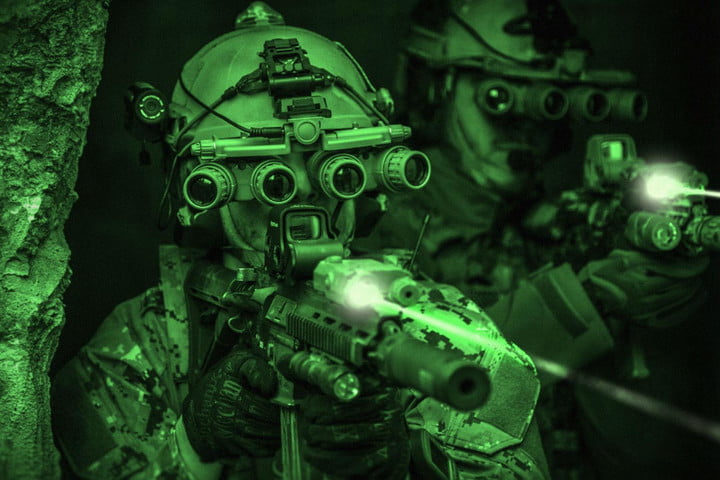
Sight Picture is the placement of the properly Aligned Sights on the Target. This is a short and throrough guide that you can use while determinig your dominant eye and thus improving the performance of your FNFNX 40
- Extend both of your arms and hands forward as in your preferred shooting stance;
- Place your hands together to make a small triangle between your thumbs and first finger of each hand slightly overlapping your fingers; your thumbs will form the base of the triangle;
- With both eyes open, look through your triangle while your arms are extended and focus on the bullseye of a target or some similar object in the room and put it in the center of your triangle;
- Now while looking through your triangle, close your left eye. If you see the bullseye or object centered in your triangle, you are right-eye dominant. But if the bullseye or object moves away from your view to the left and you can’t clearly see it, you are left-eye dominant;
- To validate your eye dominance, look through your triangle again and center the bullseye or object with both eyes open; close your RIGHT eye this time and if it remains in view, you are left-eye dominant. But if it moves away from your view to the right, you are right-eye dominant;
- To further validate your eye dominance, repeat steps 1 and 2 above, then with both eyes open bring your triangle straight back to your face; you will naturally bring it back to your dominant eye without thinking
If you are a right-handed person but your left eye is your dominant eye you don’t need to worry. The simple and effective trick is to move your head slightly to the right while aiming. You can then better align your dominant eye with the sights.
Once you have your Front and Rear Sights in the proper relationship to each other, the question then is “Where do you place the sights in relation to the target?” What is the “Sight Picture?” Do I put my Front Sight in the middle of the bullseye, at the bottom of the bullseye, at the top to cover-up the entire bullseye, or where? The answer is it depends. Guns which are sighted in for a Combat Hold mostly require the shooter to place the Front Sight where it covers the exact center of the target (Center-Mass Hold), while guns sighted in for a Target Hold usually get their accuracy when the Front Sight is aligned at the center of the bottom of the bullseye (Six-O’Clock Hold.) Self-Defense handguns usually (not always) use the quicker but less precise Combat Hold. There are several variations and personal preference plays a key role.
7 Tips To Improve your
FN FNX 40 Accuracy
Have you ever wondered how to improve your aim and accuracy with your FN FNX 40? You can find it out below, but beware, there are some physics involved. Each firearm has a specific weight. This is the weight in your hand. Now add the weight that is needed to fire your FNX 40 and you have a equation where these are compared. Let’s say that your firearm weighs 2 pounds and the trigger finger force is 12 pounds for the first shot and 5 pounds for subsequent shots. This means the force is more than the weight and we are getting to the conclusion - the gun will move. if the gun moves during the firing sequence, the shot will impact somewhere other than where it was originally aimed. This is a pretty simple concept. But how do you solve the problem? The answer is easy. Press the trigger and don’t pull it. This will end up in not moving your gun and this improving the aim. The best practice to learn it is dry fire practice.
7 [Easy] FN FNX 40 Dry Fire Practice Steps
- Step 1: Remove all ammunition from your gun.
- Step 2: Move the ammunition away from your practice area.
- Step 3: Choose a safe target and backstop.
- Step 4: Focus on your front sight!
- Step 5: SLOWLY PRESS the trigger.
- Step 6: Follow through!
- Step 7: Reset if necessary depending on your gun type.
Accuracy Training Books For FN

One of the key things to remember is regular and repeated practice. FN FNX 40 laser training is best practiced while being supervised by a professional, be it on the range or anywhere else. If you can’t afford a specialist you can always find good resources in books. Tactical training books and how to’s are one step in your way of training. Yes, you can find loads of articles online, but a book is tough to beat.
Own the Night: Selection and Use of Tactical Lights and Laser Sights
This book covers the basics of handgun light training. It is an almanac for every responsible gun owner that wants to improve their aim with a light. The book covers the instructions very well, but you have to pay attention that it was published in 2009 so some of the technical and model-specific information may be outdated.
Accessories
Mod your FN FNX 40 with these accessories
Choose from various modifications for your FN FNX 40, including holsters, parts, sights, magazines, grips, lasers, lights and cleaning utilities.

Sights for FN FNX 40
When you are prepared to fire your FN FNX 40 you must rely on your aim, which depends on your vision and that can be supported by sights. Materials and options vary, one of the common materials which sights are made of are Tritium sights.They, as well as other, have their pros and cons. Check article below about sights for your FN FNX 40.
